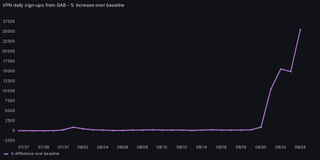Elections in Gabon: People are turning to VPNs for fear of potential internet blocks
People in Gabon are reportedly turning to VPN services amid growing tensions ahead of crucial elections set to take place on August 26, 2023.
Proton VPN recorded a significant spike in sign-ups through its VPN Observatory from the week leading up to the big day.
A clear cause for such an increase in VPN usage has yet to be confirmed. However, similar patterns have been observed in other countries as citizens increasingly prepare for internet disruptions during times of political unrest, such as elections or protests. For example, the number of VPN downloads in Turkey skyrocketed during the last presidential election due to the high risk of information blackout.
“Proton VPN has seen sign-ups in Gabon increase by more than 25,000% over the course of this week, growing for the past four days in a row with no signs of slowing down,” a Proton spokesperson told TechRadar.
Even more interesting is that such a high VPN usage is actually a new trend across the region. “We have not seen much evidence of the Gabon people using VPNs in the past,” says a Proton spokesperson. They noted, “However, people may be signing up before the election because they suspect censorship or internet disruption is imminent.”
Elections in Gabon: how likely is an information blackout?
The stakes are high for the people of Gabon as the day approaches for presidential, parliamentary and local elections. A history of post-election clashes and internet shutdowns add to an already tense climate across the country.
Gabon has restricted the internet several times in recent years. In 2021, internet restriction messages were recorded during protests related to the government’s COVID-19 measures. Also in 2019, Gabonese authorities access to internet and broadcasting services cut off after an attempted coup.
Even more worrying was the government in 2016 pulled the plug from the internet after violent clashes as citizens protested against current Gabonese President Ali Bongo Ondimba’s latest election victory.
That is why Access Now and more than 300 organizations supporting the #KeepItOn Coalition are urging the Government of Gabon to ensure full and secure internet accessibility during these crucial days.
All eyes are on Gabon! 🇬🇦🗳️ People in Gabon go to the polls on August 26 to vote in the country’s general elections. @PresidentABO must keep the internet switched on throughout the election period. #KeepItOnhttps://t.co/NgWcl9oKifAugust 24, 2023
“The internet and social media platforms play a vital role in enabling and strengthening participatory governance in democratic societies,” experts wrote. “They provide space for communication, participation in public debate, seeking information about electoral processes and candidates, reporting and documenting events and outcomes, and holding governments accountable for their actions.”
The August 25 elections are a crucial moment for the people of Gabon as they struggle against widespread poverty.
Protect your digital rights
We invite everyone in Gabon to go to our free VPN page and choose the safest freebie service before the voting begins.
The need to boost a broken economyaccording to Reutersone in three young people in Gabon is unemployed – in fact, this is at the heart of the main opposition candidate Albert Ondo Ossa’s campaign.
Still, President Bongo is doing his best to win a third term and maintain his family’s decades-long hold on power — 56 years to be exact.
Tensions among opposition parties are rising, also due to an alleged lack of transparency in recent times changes in the electoral process, including a move to single-round voting and restrictions on the number of party representatives allowed in polling places. The possibility of an information blackout is supported by reports from foreign journalists prevented from reporting on the elections.
Despite not being useful in a total internet blackout, a VPN or similar circumvention tools (such as Lantern or Tor Browser) allow users to quickly bypass geo-restrictions by spoofing their real IP address.


